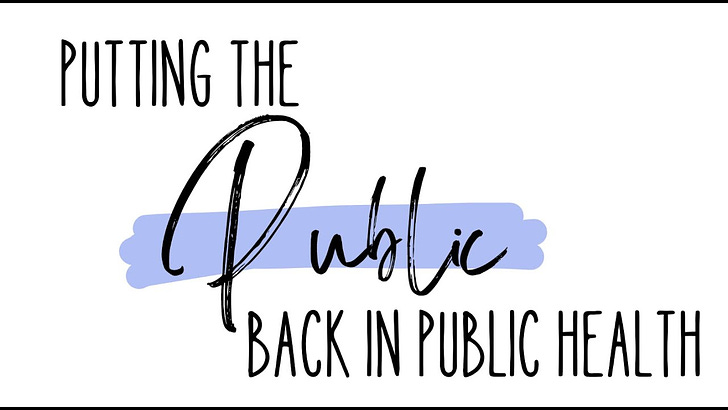Putting The PUBLIC Back In Public Health
Last week I shared my vision for putting the public back in public health at the Karl W. Weiss ‘87 Faculty Lecture Series at Allegheny College.
My presentation followed my love affair with diseases and the science of epidemiology from my undergraduate education through the COVID pandemic. It highlighted my transition from a professor and public health researcher to an exclusive contributor to a TV station and community resource. And it includes my reflections on the past three years — because the pandemic changed me.
My view of public health has changed.
My view of what it means to be healthy has changed.
And my commitment to centering a health(eco)system in our definition/description of what it means to be healthy has become unwavering.
You can watch the full presentation here —
Highlights (for those of you who cannot watch)…
My love affair with diseases and epidemiology and creating healthy communities is deeply tied to my love of reading. The power of the written word should never be doubted. Reading makes us think and connects us to new ideas, experiences, or knowledge. Books are vital to our existence. (And yes, this is political & not part of the presentation directly) Banning books is not the answer. Taking away inspiration, knowledge, and experiences of others will not make our world a better place.
Transitioning into my role on TV, as a community resource, and host of a weekly community Q&A was a full-time job. It was fun and overwhelming, scary and exciting. Through those experiences, I found my voice as an epidemiologist and recognized that a revolution is needed — we need to redefine health.
Writing here on Substack has (actually) been for me. While I have been able to answer questions, provide guidance, highlight important news, and talk through the application of science — what has really happened here on Epi(demiology) Matters is that I have been able to streamline my thinking and put onto paper my dream to create healthy communities, redefine health, and work toward health equity.
What keeps me up at night these days — MISINFORMATION. Whether it be individuals failing to translate or accurately apply public health/medical research OR individuals who are weaponizing research to scare the public into doing something to improve health, misinformation is epidemic. It is leading to increased fear in our communities, increased confusion, and a lack of trust.
What is needed moving forward? Increased collaborations. The public health community (medicine, too) needs to partner with experts in communications. Public health communications classes need to include how to prep for a TV interview, how to set up lighting in your home office for a Zoom interview/presentation, how to talk to an audience that cannot read, understand, or afford to purchase research articles (that are usually behind an expensive paywall). Collaborations are essential to improve communications and (ultimately) rebuild trust).
What does putting the public back in public health mean? It means we think of health as a system, not just individual actions to be healthy, and we work to create healthy communities for all. I truly believe if we redefine health and work toward healthy communities, we will all live healthier and safer lives. And we will all be able to discover who we are, what gifts we have, and what it is that we each have to offer this world to make it a better place.
But really — you should watch the whole talk!
And you should subscribe to Epi(demiology) Matters so you do not miss an update.
And you should share this presentation with friends — because putting the public back in public health will require ALL of us. The message needs to get out to everyone that only when we are all healthy and all of us live in healthy communities can we be truly healthy (and able to reach our fullest potential).




